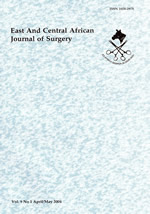
|
East and Central African Journal of Surgery
Association of Surgeons of East Africa and College of Surgeons of East Central and Southern Africa
ISSN: 1024-297X
EISSN: 1024-297X
Vol. 19, No. 3, 2014, pp. 3-11
|
 Bioline Code: js14049
Bioline Code: js14049
Full paper language: English
Document type: Review Article
Document available free of charge
|
|
|
East and Central African Journal of Surgery, Vol. 19, No. 3, 2014, pp. 3-11
| en |
A Systematic Review of the Impact of Focused Trauma Education in Low-resource Settings
Petroze, R.T.; Byringiro, J.C. & Jayaraman, S.
Abstract
Background: A variety of curricula have been developed to teach a systematic approach to
the initial hospital management of injured patients, but limited data exists on the impact
on patient outcomes, particularly in low-income countries.
Methods: We conducted a systematic review of the PubMed database to identify peerreviewed
articles from 1980 to 2012 that address the impact of focused trauma education
in low-resource settings. Studies were limited to those conducted in a low or lower-middle
income country, as defined by the World Bank. We also searched the table of contents for
all available issues from 1996-2012 of the East and Central African Journal of Surgery
(ECAJS) on Bioline International. Randomized controlled trials and studies describing
educational initiatives with before-and-after studies were selected for detailed review.
Results: We conducted 19 PubMed searches, yielding 80 unique published articles. 14
articles met the criteria for full-text review after abstract review. One article from ECAJS
met the criteria for full-text review. Four studies documented improved trauma knowledge
following the educational intervention. Two studies re-evaluated knowledge retention at
one-year and two-years. One study showed improvement in documentation of burn size
and analgesic use. No studies were identified that evaluated the impact of a focused trauma
education program on quantitative outcomes or resource utilization.
Conclusions: Very few studies evaluate quantitative outcomes following the
implementation of focused hospital-based trauma education initiatives in resource-limited
settings. More rigorous research design is necessary to evaluate patient mortality and
resource utilization in low-income and lower middle-income countries.
Keywords
global health; trauma education; low-resource settings; trauma outcomes; trauma team training
|
| |
© Copyright 2014 - East and Central African Journal of Surgery
|
|
